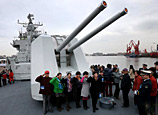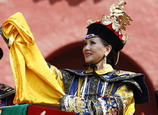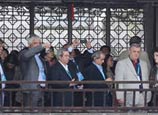
High recognition
"Most of the major French brands have high global awareness and recognition among Chinese consumers, who have in general shown a preference for brands that are widely known and respected," said Ben Cavender, principal associate at China Market Research Group.
Although newer entrants can do well in China, it is difficult to develop the kind of recognition that the French brands have developed over the years, experts said. Part of that reason is that Chinese luxury buyers are not only sophisticated but take a long time to warm up to newer brands.
"Consumers are wary of being tricked by brands trying to pose as luxury products in China, and will do their homework before buying. They don't want to make the wrong choice and look foolish," Roy said.
For Louis Vuitton, the relative contribution of Asia (excluding Japan) to group revenue rose 1 percentage point to 28 percent, while sales in France fell 1 percentage point to 11 percent and in the rest of Europe dropped 1 percentage point to 20 percent.
Hermes group reported revenue of 3.48 billion euros ($4.54 billion), a rise of 22.6 percent at current exchange rates, last year. Sales were stimulated by non-Japan Asia, which grew 25 percent. The network added two new branches in the Chinese mainland and Taiwan, and six other stores were renovated or expanded, it said in its financial report.
But, with an overall slowing of luxury goods sales, demand for most of the brands in China has tapered off.
"The crackdown on official corruption and luxury goods is having an impact, particularly on brands on the more premium side like Chanel. Louis Vuitton, which is primarily popular as a mass luxury brand, has been more resilient in the face of these campaigns as it has a broader base of customers than most luxury brands," Roy said.
Louis Vuitton has more than 40 stores in China. But with China becoming a battlefield for luxury brands, there is a risk of Louis Vuitton becoming too mainstream.
"The company is now starting to limit the number of stores it is opening and focusing more on higher-value products to retain their brand image," Roy said.
Bernard Arnault, the CEO of LVMH, which owns Louis Vuitton, said the company intends to pull back from some smaller cities, and focus more on quality, instead of opening stores in China.


















 Giant pandas safe in quake-hit zone
Giant pandas safe in quake-hit zone


![]()
